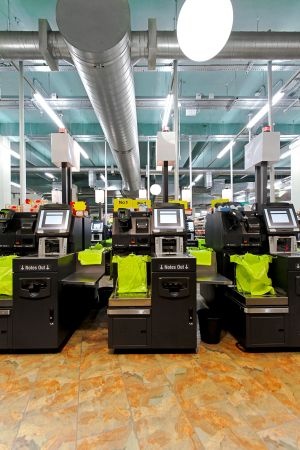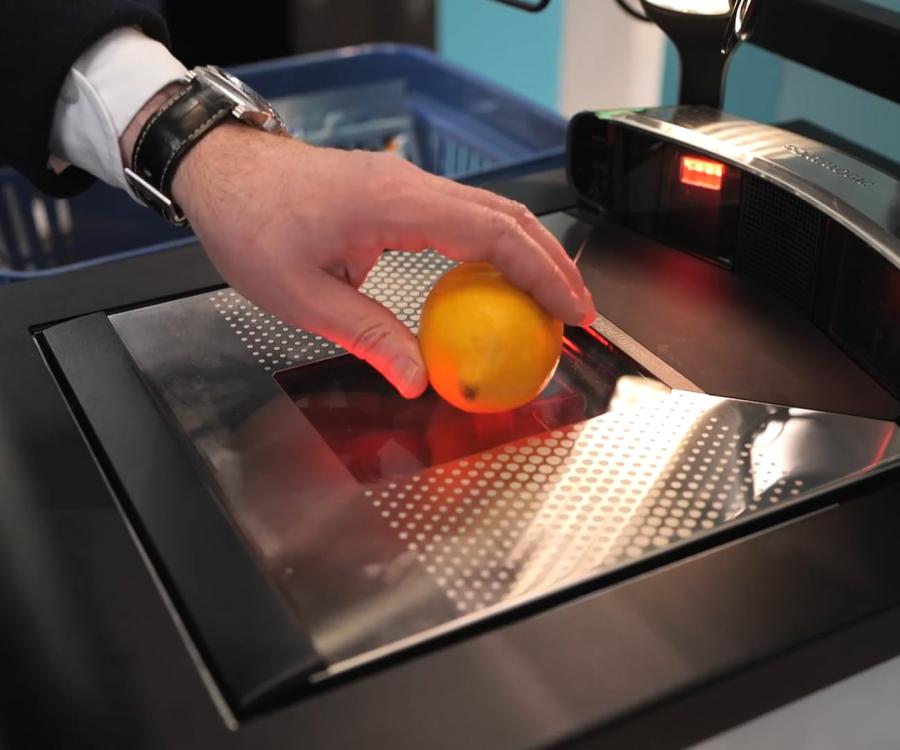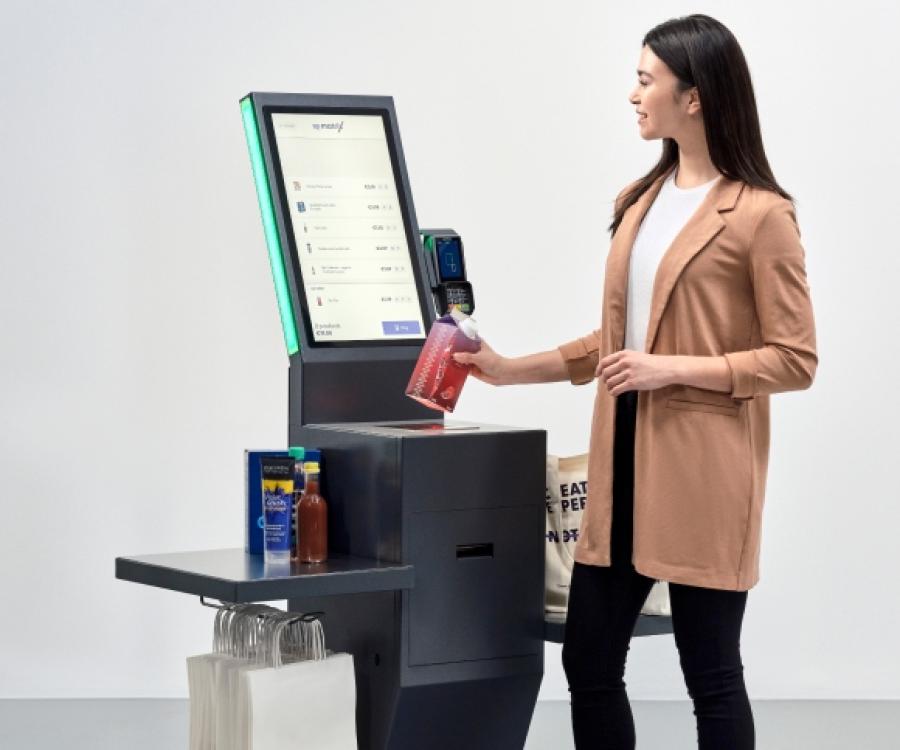
The annual “Global EPOS and Self-Checkout” report care of London-based market research and consulting firm RBR shows what is happening around the globe at self-service checkouts. According to the report, retailers worldwide provided their customers with almost 300,000 self-checkout stations by the end of 2017 – a significant 14% rise over 2016. One of the reasons for this is the general digital transformation we are currently undergoing. “When retailers perform tech upgrades on their stores, checkout technology is often an integral part,” says the market research firm in its report.
The US retail trade continues to post the most installations by volume. For instance, major players like Kroger and Walmart both replaced old systems and set up new SCO terminals in 2017. Overall, the number of checkout units delivered (2017 to 2016) rose by 25 percent in North America and by 20 percent in the Asia-Pacific region. Especially in countries like Canada or Japan, researchers have found that self-service checkouts are increasingly being used because it is hard to find staff to man tills or because high wage costs are prompting retailers to look for alternatives.
Fewer New Installations in Europe
The picture for Europe, however, is very different. While only 1 percent more self-service checkouts were installed in Central and Eastern Europe in 2017 than the previous year, the figure in Western Europe was a striking 16 percent lower. Manufacturers see this as an exception amidst otherwise positive developments. “Record years are always followed by a year when new installations decline,” says Stefan Clemens, Area Sales Leader at NCR. “Since early adopters like France have already carried out extensive rollouts, this has numerical effects – but from our point of view at least the European market is far from saturated,” adds Ulrich Völlmecke, Principal Business Consultant at Diebold Nixdorf.
This certainly also applies to Germany. According to EHI figures, just over 3,000 stationary self-service terminals had been installed in almost 500 stores by the end of August 2017. Edeka and the Rewe Group, Kaufland and real hypermarkets all boast self-service checkouts in well over 50 of their stores each. By contrast, German retailers, including Edeka and Selgros, operated a total of just 41 self-scanning systems on the reporting date. However, this number has now increased because the hypermarket firm Globus has entered mobile scanning on a larger scale.
Another still scarcely represented area is self-service technology in the German non-food sector, where only Ikea, Bauhaus and Decathlon operate with a larger number of self-service checkouts. From discussions and working groups, however, EHI project chief Simone Sauerwein knows that “further DIY store operators as well as retail drugstores are debating the issue in depth.” And so are discount stores. Lidl, for example, is gathering initial experience with self-service technologies through tests. In Great Britain, the retailer has fitted out some of its stores, especially city-centre outlets with high footfall, with stationary self-service terminals. In Portuguese branches, an App is also being tested that customers can use to scan the goods by Smartphone. The Edeka subsidiary Netto is also running a pilot project to see if express self-service checkouts will work at small discount stores.
Usage Rates often exceed 20 percent
In general, the technology is widely accepted by customers. According to EHI, almost all retailers offering self-service stations are very satisfied with usage rates. Often, over 20 percent of transactions are performed using the terminals – though in the cash country of Germany only where cash payment is possible. Almost all the self-service stations set up here therefore have cash modules. On the other hand, the Swiss Migros Group, for example, exceeds the 20 percent usage rate even though it only accepts card payment. At some busy locations like railway stations, Migros even achieves a transaction share of up to 50 percent. “Above all, the goal of cutting waiting times using SCOs has been very successfully achieved in all companies,” says EHI expert Simone Sauerwein.
Manor AG, Switzerland's largest department store chain, is taking an unusual approach to integrating self-service stations into the checkout zone. The company has installed hybrid POS systems in over 30 of its food-halls. The self-service terminals can be converted into conventional cash registers at any time, allowing Manor to react flexibly to different customer footfall. Furthermore, their bagging areas can also be arranged variably and adapted to the room situation.
The EHI analyses have shown that the companies surveyed encounter hardly any problems with the functioning of their self-service stations. The technology is mature and providers not only offer a wide range of options but are also very accommodating when it comes to custom requests. “Retailers are not prepared to simply adapt the processes developed by suppliers – so we have to respond more flexibly to their and their customers’ habits,” says Christoph von Lingen, Country Sales Leader Retail at Toshiba. “In general, retailers are trying to make the customer journey more imaginative. The range of different pilot projects shows that the market has changed considerably,” adds Ulrich Völllmecke from Diebold Nixdorf.
Sensible Options and Further Developments
So EuroCIS 2019 will not be showcasing spectacular innovations but instead sensible options and further developments. Fujitsu, for instance, has announced it will use its expertise in artificial intelligence and image recognition to give users a head-start in speed, security, fraud detection and ease of use. At EuroCIS, Diebold Nixdorf will be presenting new combinations of self-scanning and payment modules that have a smaller footprint and support the closed cash cycle. Toshiba is optimising the user interface and workflow in order to further reduce the intervention rate – i.e. the necessary interventions of a cash register supervisor. NCR, for example, has optimised recognition for items that need weighing like fruit or vegetables and automated age verification for tobacco products and alcohol purchases at the self-service checkout. Here, they have integrated Yoti age recognition technology which verifies within a few seconds whether a person is old enough to buy the product.
Furthermore, integrating omnichannel functions in self-service cash registers now scarcely poses any technical problems for manufacturers. In most cases, the retailer's existing POS application is used, which just needs to be omnichannel-capable. Here the SCO is connected just like a manned cash register would be. Corresponding cross-channel services involving self-service systems can already be found in operation today. The market leader among wholesalers in Germany, for instance, offers its customers the option of having pre-ordered goods packed while also allowing them to pick other desired articles in the store and checking out both baskets together at the self-service station.
More Scope for Return on Investment
More good news for EuroCIS 2019 is that retailers’ return on investment calculations for SCO systems could prove significantly more pleasing in future. Firstly, volume effects, i.e. the steadily increasing number of units sold, increase the manufacturers’ price flexibility. Secondly, cash payment rates are declining worldwide, which means that fewer and fewer cash modules have to be installed in self-service systems. "These are expensive and, more importantly, very high-maintenance – doing without them would massively cut the total cost of ownership,” says Christoph von Lingen from Toshiba.
Ultimately, all manufacturers are working to minimise integration costs. For retailers these cash modules often a “black box” in the run-up to SCO projects and are just as often a cause for dispute when it comes to the final settlement stage of the project. Here, providers are trying to achieve greater transparency and efficiency. “We will be presenting our new ‘SCO as a device’ (SCOaaD) integration platform at the trade fair, which significantly reduces costs of integration into existing POS software,” promises Ralf Schienke, Head of Retail at Fujitsu Technology Solutions GmbH, for example.
With Fujitsu, NCR, Toshiba and Diebold Nixdorf attending, EuroCIS 2019 presents the major global players among the SCO providers. ITAB and various manufacturers of SCO-relevant components such as scanners, hand-held scanners and cash modules are also represented. For retailers wishing to gain a quick overview: as in previous years, the EHI’s “Self-Checkout Initiative” once again offers a theme-based tour of the trade fair taking you to all relevant stations and exhibition stands.
EuroCIS 2019 held in Halls 9 and 10 of Düsseldorf Exhibition Centre is open to trade visitors daily from 10.00 am to 6.00 pm from Tuesday, 19 to Thursday, 21 March 2019. Day tickets cost Euro 30 (Euro 20 online in advance) and two-day tickets cost Euro 45 (Euro 35 online in advance). Students and trainees pay Euro 12. All admission tickets include a free return trip to the event on public transport (within the transport network of VRR).









